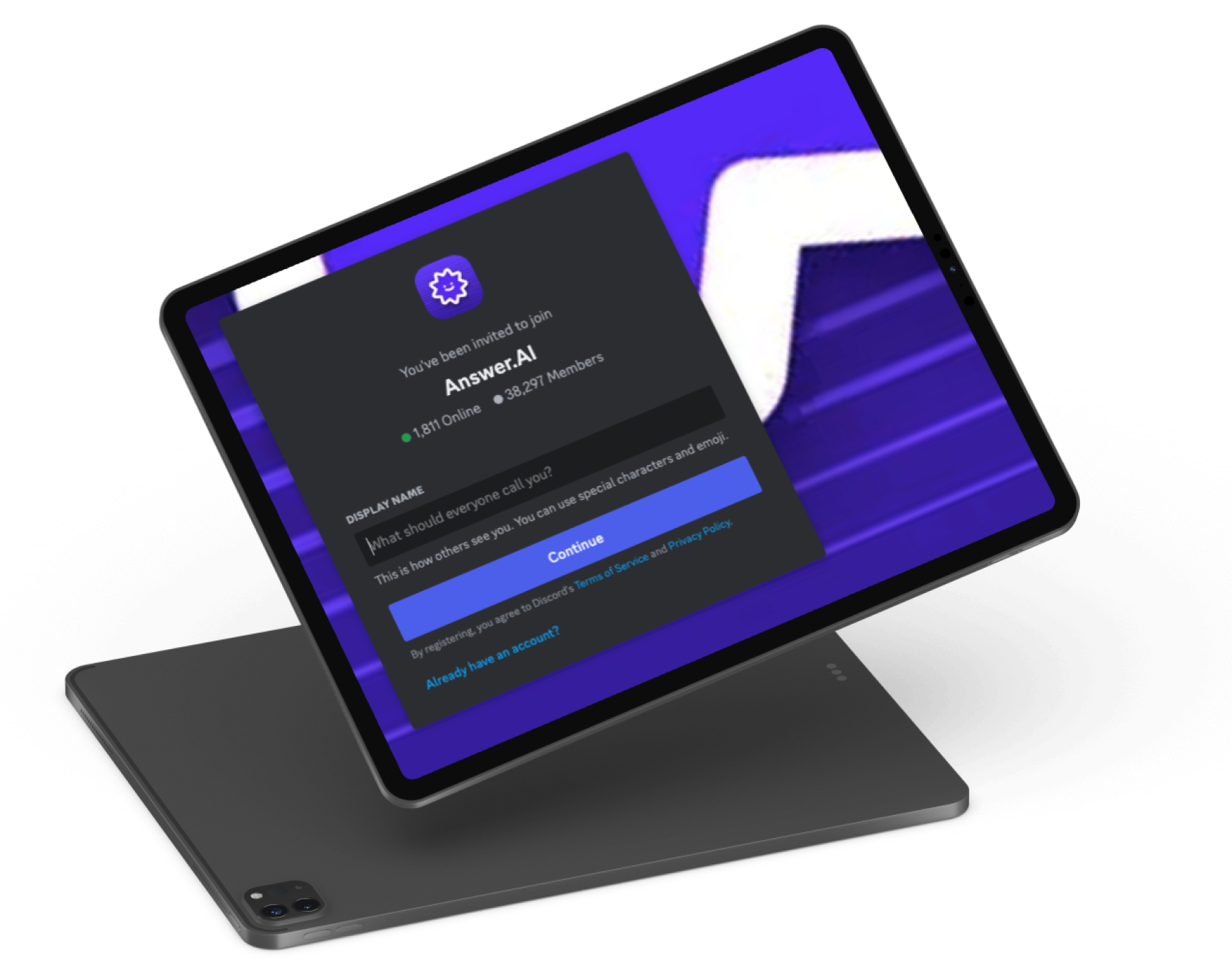Do You Have to Choose a Major When Applying to College? [FAQs+Guide]

Table of contents
To major or not to major? That is the question. When it comes to applying to college, one of the most common questions students face is "Do you have to choose a major when applying to college." The answer isn't straightforward, and the reality is that the answer varies depending on the institution, the type of program, and the student’s long-term goals.
This is such a frequent question often asked by our Answer.AI high-school users that we decided to write this post to help support everyone currently going through the college application process. Answer.AI has over 6 million users ranging from middle-school students to post-graduate students. We use the power of AI to create the most powerful personal tutor, to support students, parents, and teachers reach their desired academic goals. If you haven't done so yet, please join the #AIforEducation revolution by downloading Answer.AI for iOS or Android.
This article is a comprehensive guide on all things major declaration before going to college, including:
- Misconceptions about major selection
- How major declaration varies by college type
- Programs that typically require early major declaration
- Benefits of entering colleges undeclared
- How AI tools can help with major selection
Ready to get started? Let's go!
Understanding College Major Declaration
The decision-making process, reasoning, and emotions behind declaring your major can be different for everyone. Maybe you are someone who has tried out multiple different subjects in high school and doesn't like the idea of having to choose one specialty. Maybe you are someone who has dreamed of being a doctor since you were young, and have a whole roadmap that makes choosing your major a breeze. Maybe you are looking through college majors and don't even know where to start.
No matter where you are on that journey, you must take the time to consider what you want to study and why. Your major will most likely determine how you spend most of your class time, study hours, internships, and future careers. Think through what matters to you and what you want the most from your college experience, including factors like:
- Financial Stability: Is this major statistically known to provide more financial stability and job security?
- Passion: Do I want my major to align with my passion projects and goals?
- Creativity: Do I want to study something that utilizes the rational or creative side of my brain?
- Difficulty/Workload: How much do I want to be challenged with my major?
- Balance: Are there other aspects of my college life that hold more importance?
- Long-term career: Are there requirements for pre-professional programs like medical or law school I want to apply to? Which majors would cover the most prereqs?
Your decision will probably be a mix of these factors, as well as other aspects that are unique to your experience.
What is a College Major?
Before diving into whether you must choose a major, it’s important to understand the role a major plays in the college admissions process. A major is typically a focused area of study that dictates the academic path a student will follow once admitted. Choosing a major affects several aspects of college life, from coursework requirements to career opportunities post-graduation. Some key aspects of a major include:
- Academic Focus: Your major will determine the classes you take and the academic requirements you must meet.
- Career Path: Many students choose a major based on the career they want to pursue after graduation.
- Admission Process: Some colleges may use your major choice to evaluate your academic interests or fit with the program.
Do You Have to Choose a Major in Your Application?
The requirement to declare a major during the application process is not universal. Some colleges and universities will ask applicants to select a major, while others leave this decision to be made once students are admitted.
Some colleges ask applicants to select a major at the time of their application. At most schools, students formally declare their major by the end of their sophomore year (or second year of study). Declaring a major helps you:
- Register for major-specific courses
- Get assigned an academic advisor in your department
- Plan for graduation requirements
Why Do Colleges Want You to Declare Your Major When Applying to College?
The reasoning depends on the type of college and degree you are pursuing, but there are some general reasons why they may want you to declare your major when applying:
- Enrollment planning: Colleges need to manage class and department sizes, faculty hiring, and resource allocation. They also want their class to be academically diverse, meaning they want a balance of different disciplines each year. By having students declare their major early, they can predict this distribution and make decisions accordingly.
- Competitive programs: Some majors like engineering and nursing have limited spots and require early admission due to high demand. In addition, some programs may be highly coveted by specific universities (the Computer Science program at Stanford or Northwestern's renowned Medill School of Journalism being two examples).
- Academic advising: Declaring a major early could also be due to pairing students with academic advisors. If a school wants to plan and help you find that support system before the academic year begins, declaring your major early is a good start. q
- Scholarship & Funding Decisions: Some departments and majors qualify for specific grants, scholarships, or research opportunities, even starting your freshman year. Schools may want to use this information when awarding financial aid. If you want to help understand the 6 types of financial aid, you can check out our article.
- Retention & Graduation Rates: Students who have a clear academic direction are more likely to stay on track and graduate on time, which benefits both the student and the institution.
Programs that Typically Want You to Declare Early
Choosing a major before setting foot on campus is more common at schools with specialized programs, such as those offering highly competitive or structured degrees. Here’s why some institutions might ask you to declare a major upfront:
Programs that are more likely to require you to declare beforehand, or include:
- Engineering
- Architecture
- Fine Arts
Engineering Programs
Though there are colleges that permit students to declare Engineering later in their college career, many require students to declare their major before their first day. A lot of it has to do with how many courses you need to take to fulfill the degree (Boston University, for example, has 30 units of math and natural science prereqs in addition to engineering-specific core classes you need to finish before graduating). It becomes increasingly difficult for students to be able to fulfill these requirements if they declare the major later in their career—they simply do not have the space, units, or time. Knowing this, universities want students to start core classes in their freshman year, and having students declare their major early ensures they stay on track and follow structured coursework.
Architecture Programs
Architecture programs typically require you to declare your major before starting. Like Engineering, this is typically due to a course load that is structured and sequential, meaning that there is a required order in which you must take classes. Some colleges even have it so that these required courses are available once a year during specific semesters (ARCH101 only opens in fall freshman year, ARCH102 opens in sophomore spring being a hypothetical example). These programs also require a lot of hands-on work that you'll need to learn early on.
Fine Arts
Fine Arts degrees are unique in that most require you to declare your major and students who want to study art are already submitting arts supplemental materials in their Common Application. When you are pursuing a Bachelor of Fine Arts, you typically have to take a lot of introductory courses for a variety of art disciplines, and your freshman year may consist of courses from painting and drawing to photography and sculpture. Declaring early helps you take intro classes and then have time to choose a concentration, have time to develop your practice, and produce work for showcases and honors programs. If you are interested in pursuing a BFA, colleges will most likely request a portfolio as well, so make sure that you have some materials prepared as you are planning your college admissions timeline.
I Don't Want to Choose My Major Right Now. What Do I Do?
If you don't want to declare your major when applying for college, that's okay! Many colleges allow applicants to apply without committing to a major right away. These schools typically offer a more flexible academic structure, allowing students to explore different areas of interest before settling on a major. For students uncertain about their future careers or academic passions, this can be a huge advantage.
- Exploratory or Undecided Majors: These options allow students to apply as “undecided” or “exploratory” majors, giving them the flexibility to choose their academic direction after gaining more exposure to different subjects.
- General Education Requirements: Some colleges have a strong focus on general education (GE), meaning students must take a wide range of courses before selecting their major. In these cases, it may not be necessary to declare a major upfront.
- Liberal Arts Colleges: Many liberal arts schools offer a broad curriculum and allow students to explore different academic paths before settling on a major. Students can enter as “undecided” and choose a major once they have explored different fields.
Examples of Colleges that Typically Do Not Require a Major Declaration
Numerous colleges allow you to apply without declaring a major. Some examples include:
- University of Chicago: Known for its liberal arts education, students can apply without choosing a major and are encouraged to explore different subjects before making a decision.
- Brown University: Brown allows students to design their curriculum and often admits students without requiring a major selection, enabling them to take classes across disciplines.
- University of Washington: Students can apply to the university without declaring a specific major and then choose their path after taking introductory courses.
Strategies for Choosing a Major for Your Application
If you're required or given the option to choose a major on your application, consider the following strategies:
- Play to your strengths: Choose a major that aligns with your academic strengths and extracurricular activities. This allows you to present a cohesive and compelling application.n
- Consider less competitive alternatives: Some popular majors, like computer science or business, may be highly competitive. Consider related but less competitive majors to increase your chances of admission.
- Research the college's strengths: Choose a major that aligns with the college's strengths and reputation. This shows that you've done your homework and are genuinely interested in what the school has to offer.
- Be authentic: Don't choose a major solely because you think it will improve your chances of admission. Admissions officers can often spot insincerity in applications.
- Keep your options open: If you're truly undecided, consider applying to schools that don't require a major declaration or that offer flexibility in changing majors later.
The Pros and Cons of Choosing a Major Early
If you’re asked to declare a major during your application process, or if you choose to do so voluntarily, there are some pros and cons to consider. Understanding these factors can help you make a more informed decision.
Pros of Declaring a Major Early:
- Clear Focus: If you already have a good idea of what you want to study or pursue in your career, then declaring a major early can help you hit the ground running. Instead of spending time figuring out what to study, you can dive directly into courses that are aligned with your interests and future career paths. This focused approach can be especially helpful for specialized fields like engineering, architecture, or fine arts, where coursework is highly structured.
- Admission Consideration: Some programs, especially competitive ones like business, engineering, or nursing, may have specific entry requirements. By declaring your major early, you demonstrate to the admissions committee that you are serious about your academic and career goals. It shows commitment and readiness for the program, which may increase your chances of being accepted into more selective programs.
- Quicker Program Completion: Declaring your major early means you can start taking the required courses right away, which can help you graduate on time. Many degree programs, particularly those in fields like medicine or law, have a well-defined sequence of classes that must be taken in order. By selecting a major early, you can stay on track and avoid unnecessary delays, making it easier to meet graduation requirements.
Cons of Declaring a Major Early:
- Limited Flexibility: Some majors, particularly those with highly structured curricula like engineering or fine arts, can make it challenging to switch fields later on. Once you’ve committed to a major, it may be difficult to transfer to a completely different program, especially if the new field has its own set of prerequisites. If you're unsure about your long-term interests, declaring early might limit your ability to explore other academic disciplines down the road.
- Pressure to Decide: Choosing a major can feel like a big decision, and for some students, the pressure to pick the "right" major can be overwhelming. High school seniors might feel rushed to choose without fully exploring all their options. While it's normal to feel uncertain, choosing a major early when you're unsure can lead to dissatisfaction if you change your mind later on. It’s important to remember that many students switch their majors after their first or second year, so it’s okay to take your time and reflect on what truly excites you.
- Uncertainty: If you’re still figuring out what you want to do in the future, declaring a major early could feel like a commitment to a path you may not want to follow later. For students who are unsure about their career aspirations, this decision can feel like an added burden. It can be difficult to foresee how your interests will evolve. Some students may discover new passions or career options as they explore courses during their first year, and locking themselves into a major too soon could limit those opportunities for exploration.
Tips for College Applicants
Regardless of whether you choose to declare a major or apply undecided, here are some tips to help you navigate the college application process:
- Do Your Research: Thoroughly research the colleges you're interested in, including their academic programs, extracurricular activities, and campus culture.
- Talk to Your Counselor: Consult with your high school counselor to discuss your academic goals and get personalized advice.
- Seek Guidance from College Advisors: Many colleges offer college advising services to help students with the application process, including major selection.
- Take Advantage of Campus Visits: Visit college campuses to get a firsthand look at the academic environment and talk to students and faculty.
- Don't Stress Too Much: Remember that your major isn't set in stone. Many students change their majors multiple times during their college years.
Ultimately, the decision of whether to declare a major or apply undecided is a personal one. By carefully considering your academic interests, career goals, and the specific requirements of the colleges you're applying to, you can make an informed decision that will set you up for success in college and beyond.
As a student, there are a plethora of sources to get advice, but the only resource that you will need to answer ALL your educational questions is Answer.AI. We have built the most powerful technology platform to support students from all backgrounds and at all levels. You can download Answer.AI on the App Store, Google Play Store, and Chrome Web Store. You can also check out our blogs and events for more free resources.

Join our Discord community
Get updates on upcoming webinars, live discussions, peer support, and more.
Join the community





